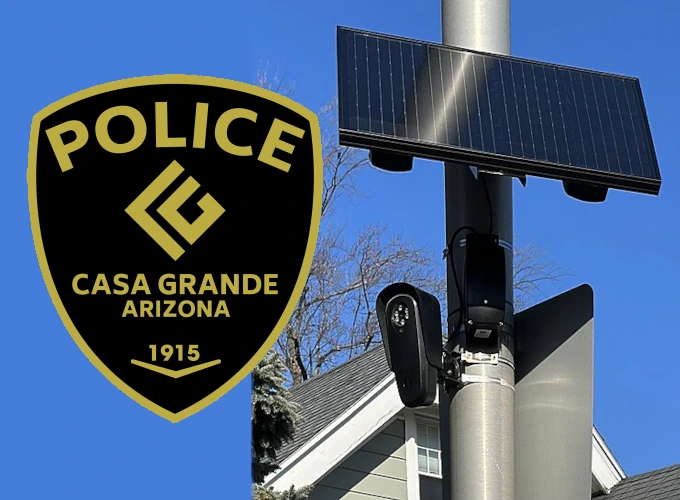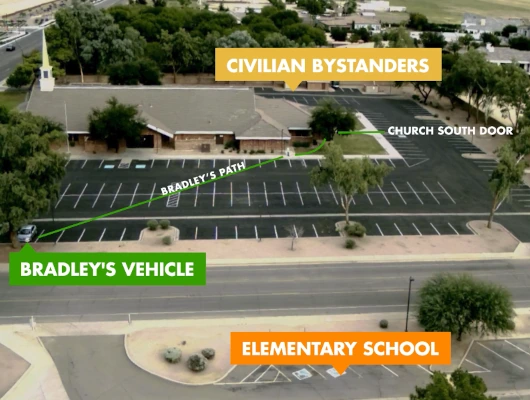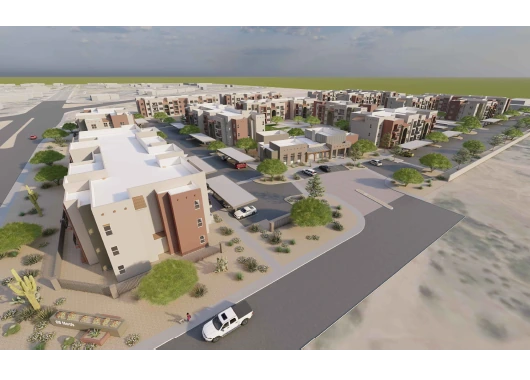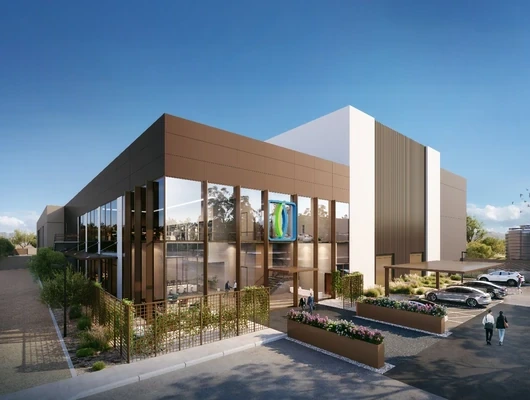Key Points
- Casa Grande City Council reviewed a proposed 10-year, $10 million Flock Safety “Safe City Initiative” at an August 18 study session. No vote was taken.
- The plan would expand beyond the city’s current 22 license plate readers to include drones, live-video PTZ cameras, gunshot detection, mobile trailers, and a Real-Time Intelligence Center.
- Integration with private and school cameras is envisioned, creating a unified citywide surveillance network accessible to police, fire, and other departments.
- Flock Safety retains ownership of hardware; Casa Grande would own the data, with 30-day retention limits on license plate and PTZ footage.
- Supporters, including councilmembers and the police chief, say the system would be a “force multiplier” for public safety, improving patrol efficiency, investigations, and response times.
- The initiative comes amid national legal and privacy controversies over Flock’s technology, including a 2024 Virginia ruling deeming citywide ALPR use an unconstitutional search and recent restrictions in Illinois, California, and Virginia.
- Council must still decide on key policy issues such as drone oversight, private camera integration, data sharing rules, audit requirements, and public transparency.
- Use deflock.me to find camera locations.
City Council weighs approximately $10 million Flock Safe City program over 10 years during study session
Casa Grande officials examined a comprehensive surveillance technology proposal during an August 18 study session that would dramatically expand the city’s law enforcement capabilities through drones, additional cameras, and a centralized monitoring system. The discussion focused on a proposed 10-year contract with Flock Safety totaling approximately $10 million over the decade that Police Chief Mark McCrory called “probably one of the top two decisions that council had to do” in recent years.
The session was informational only, with no vote scheduled. Council members will need to decide whether to move forward with the program in future meetings.
Building on Current Success
Casa Grande already operates 22 Flock license plate readers installed in early 2023, which Chief McCrory said have delivered significant results. The existing cameras have identified and recovered 212 stolen vehicles and led to more than 160 arrests directly tied to the system. Officers have proactively entered suspect vehicle information into the Flock system 580 times to assist criminal investigations.
“We’ve had really good success with our 22 cameras,” McCrory told the council, “but what frustrates me and Brian is we have certain cameras that get hit with a stolen car, and then the car vaporizes because we don’t have enough cameras to track where that car is actually going.”
Proposed System Components
The Safe City Initiative would add extensive new technology to Casa Grande’s public safety arsenal:
License Plate Recognition (LPR): 78 additional cameras beyond the current 22, using AI-powered vehicle detection to automatically scan and identify vehicles. Cameras capture license plates and vehicle attributes such as make, color, type, and distinguishing features (e.g., bumper stickers, roof racks).
Live Video Monitoring (PTZ cameras): HD cameras with intelligent analytics, placed alongside LPRs and in city parks and areas hosting large community events like the Electric Light Parade.
Audio Detection: Gunshot detection devices covering about a one-mile radius in areas with the highest concentration of gunshot-related calls. Flock’s “Raven” system.
Drone as First Responder (DFR): Four drones deployed from two launch sites, each capable of covering 38 square miles with 40 minutes of flight time and speeds up to 49 miles per hour, according to Hamza Al-Baroudi, Flock Safety Representative. This utilizes Flock’s “Aerodome DFR” technology.
Mobile Security Trailers: Portable cameras for flexible deployment in areas lacking permanent coverage.
FlockOS: A unified command and control platform that integrates all systems and displays real-time information on a Google Maps-style interface.
Flock Nova: An investigative platform providing advanced analytics that consolidates multiple databases into a single searchable system.
Flock911: Real-time response tool allowing officers to hear 911 calls in their vehicles and at the monitoring center before dispatch.
Nightshift: Automated analysis software that works overnight to connect crimes by analyzing call data and suggesting investigation steps. As Chief McCrory explained, “it analyzes all your calls in your Computer-Aided Dispatch (CAD) system and pulls out like calls, so it connects crimes. The next morning you come in and it goes, ‘Good morning, Mark McCrory, this is what we found, this is what we believe your next steps ought to be in your investigation'”.
Hotlists: Digital files containing license plate information for vehicles of interest, including stolen vehicles, plates associated with wanted persons, AMBER Alerts, missing persons, and vehicles suspected in criminal activities. These can include national databases and manually entered information from local crimes.
Unified Resources and Camera Integration
The system would create what Deputy Police Chief Brian Ramirez called a comprehensive camera network. “We are gonna be able to log into cooperating private businesses, private home cameras, individual cameras, all city cameras, school cameras, and have access to them,” McCrory explained.
The city would establish a public website allowing residents and businesses to register their cameras. Ring camera owners could voluntarily provide access information, while businesses could opt for real-time camera access. Union High School, which has 270 cameras throughout its campuses, would be among the integrated systems, though Ramirez noted “I don’t know that we need to see all 270” and would work with schools to determine which cameras would be most beneficial.
All city cameras would connect through gateway hardware, providing real-time access for police, fire, and other departments. The system includes automatic upgrades and access to new sensor technologies at no additional cost. Importantly, Flock retains ownership of all cameras and equipment under this contract structure, while Casa Grande owns all footage and data captured by the system.
Real-Time Intelligence Center
The proposal includes establishing a Real-Time Intelligence Center (RTIC) housed in a repurposed communication room at the police department that is already being built out using RICO funds. The center would be staffed initially by one officer from a specialty unit – importantly, this officer comes from a unit that won’t impact patrol or investigations staffing. Chief McCrory noted that this officer is already a drone pilot, which he said would be particularly helpful for the new role.
The center would handle calls remotely using cameras and drones, potentially allowing responses like: “We launch a drone, we might have a camera in the area, or even better yet, we are tied into that business’s cameras, we see those people, those suspects already left. Call’s handled, we don’t waste time going out there, our officers are onto something different.”
The system would automatically detect motion in closed parks after hours and alert both police and community services staff. As McCrory explained, this would prevent situations where “we don’t have to worry about waking up the next morning and from somebody taking a walk in the park we find out that somebody had been in there for two hours seeing how many donuts they could do in their new pickup truck.”
Cost and Funding Structure
The comprehensive system carries substantial costs that increase over five years:
- Year 1: $165,000
- Year 2: $267,883
- Year 3: $511,687
- Year 4: $877,392
- Years 5-10: $1,365,000 annually
The hardware alone would cost more than $1.3 million if purchased outright according to Police Chief McCrory. Recurring expenses include a dedicated internet line, gateway firewall replacements every seven years, routing and switching equipment updates, and regular workstation replacements.
Funding sources already identified include:
- $300,000 from the State of Arizona’s FY26 budget
- $544,000 in FY26 capital improvement projects from police, community services, and city manager’s office budgets
- $844,000 in current-year camera project funding
- Police RICO funds and donations for initial Real-Time Information Center construction
- Multiple grant applications submitted for additional support
The contract includes a non-appropriation clause allowing the city to reduce services or cancel with 30-day notice if funding becomes unavailable.
Flock Safety’s Legal Challenges and Policy Context
Flock Safety has faced significant legal scrutiny across multiple states. In June 2024, a Norfolk, Virginia judge ruled that using Flock’s citywide license plate reader network constituted an unconstitutional search and threw out camera evidence in a criminal case. The Institute for Justice has filed federal lawsuits challenging the systems as “unconstitutional mass surveillance.”
In May 2025, records revealed a Texas officer searched Flock’s national database for someone “who had an abortion,” leading Illinois to block 62 police agencies from accessing state data. Flock subsequently removed California, Illinois, and Virginia from its National Lookup tool due to privacy concerns.
Flock Safety Timeline
The following chronology shows how Flock’s technology and legal challenges have evolved since Casa Grande first adopted the system:
2017
- Flock was founded by Garrett Langley, Matt Feury & Paige Todd. Camera product launched. The system solved its first crime later that year and launches products such as the Falcon Camera to improve neighborhood safety. (Flock Safety, Flock Safety)
2021
- Raven launched — Flock debuts its AI-powered acoustic gunshot detection system (Wikipedia).
2022
- September 19, 2022 (CASA GRANDE, AZ) — Casa Grande City Council passes Resolution No. 5463, approving the city’s first Flock contract for 14 Automatic License Plate Reader (ALPR) cameras at $44,000 for one year using RICO funds. Contract establishes key policy commitments:
- 30-day data retention with automatic deletion
- Required audit trail with reason codes for searches
- Explicit limitations: “NOT facial recognition, NOT traffic enforcement, NOT connected to registration data (DMV)”
- Casa Grande owns footage while Flock owns cameras
- City marketed program as making department “professional, progressive and transparent”
2023
- Early 2023 (CASA GRANDE, AZ) — Casa Grande’s LPR system becomes fully operational with 22 cameras (the city had expanded beyond the original 14 cameras approved in 2022). Police Chief Mark McCrory later reports system identified/recovered 212 stolen vehicles and led to 160+ arrests in first operational period.
- San José, CA — Raven audio sensor trial shows only ~50% accuracy at first; after recalibration, improves to 81% confirmed gunfire with fewer false alarms (Wired).
- Flock’s claim — Company promotes Raven as identifying gunshots with ~90% accuracy, dispatching in under 60 seconds and pinpointing within 90 feet. However, real-world testing in San José showed ~50% accuracy initially, improving to 81% confirmed gunfire after recalibration (Wired, Flock Safety, Flock Safety).
- Morgan Hill, CA — Police use Raven audio sensors + ALPR to arrest a gunfire suspect; Flock cites this as a success story (Flock Safety).
2024
- May — Flock announces solar-powered Condor AI video units; ACLU urges communities to reject them, citing surveillance risks (TechCrunch).
- June (Norfolk, VA) — A judge rules that using Flock’s citywide ALPR camera network counts as an unconstitutional search and throws out the camera evidence (GovTech).
- July (Texas) — The Texas Department of Public Safety issues a cease-and-desist order against Flock Safety, saying it was operating as a private security company without a license. Police-owned Flock cameras were not affected, and the company said it would work toward compliance (GovTech).
- October — Institute for Justice files a federal lawsuit against Norfolk’s ALPR program, calling it “unconstitutional mass surveillance” (IJ).
- October — Flock acquires drone company Aerodome, expanding into rapid-response aerial surveillance (Wikipedia).
- October — Raven expands to detect sideshows (illegal street stunts), tied to license plate tracking (Flock Safety).
2025
- February — Judge denies the City’s motion to dismiss; IJ’s constitutional challenge is allowed to proceed (Institute for Justice).
- May — Leak reveals Nova platform could combine ALPR, video, and third-party data. After criticism, Flock pledges not to use hacked or dark-web sources (GovTech).
- May – Records show a Texas officer searched Flock’s national database for someone “who had an abortion.”
- May (Roanoke, VA) — FOIA case: A reporter from Cardinal News requests footage of his own car from Flock cameras. Officials deny it, but a judge rules the request valid under FOIA and orders the footage released (Cardinal News, WDBJ7).
- June — Flock unveils Condor upgrades: Guardian Mode (auto-tracking) and People Detection Alerts (Flock Safety).
- June — Flock disables its National Lookup tool in California, Illinois, and Virginia, blocking out-of-state access to license plate data from those states. (Flock).
- June (Alameda County, CA) — County supervisors approve a $600k Flock drone program for emergency response, with limits like 60-day retention and public flight logs (SF Chronicle).
- July (Virginia) — New state law (HB 2724) takes effect: it caps ALPR retention at 21 days, restricts out-of-state data sharing, and classifies ALPR data and audit logs as confidential → not available under FOIA. This effectively rolls back the access journalists had just won in the Roanoke FOIA case, meaning the public can no longer request their own plate scans or see how police are using Flock cameras. The law also prevents other agencies (like ICE or ATF) from pulling Virginia ALPR data through Flock’s national network, responding to growing controversy over federal use. (VPM).
- July (Dunwoody, GA) — Police launch Flock drones as 911 first responders, often arriving in 90 seconds; praised for speed but criticized as “constant aerial surveillance” (Axios).
- August 14, 2025 — IJ broadens the campaign: IJ launches a nationwide effort to stop warrantless ALPR use, citing the Norfolk litigation as the opening case. (IJ)
- August 18, 2025 (CASA GRANDE, AZ) — City Council study session on proposed approximately $10 million, 10-year Flock “Safe City Initiative” expansion. Proposal includes drones as first responders, gunshot detection, and Real-Time Information Center. Represents massive expansion from original 2022 policy scope that explicitly excluded facial recognition and limited use to license plate reading.
- (Set for Oct 2025) — Trial schedule: Local coverage reports the Institute for Justice vs. the City of Norfolk Federal ALPR trial is slated for October 2025. (13newsnow)
Privacy Protections and Data Security
The proposed system includes multiple internal security measures for law enforcement use. “Any time an officer logs into the Flock system and searches a license plate, they’ve got to put a case number. There has to be a reason why they did it,” Ramirez explained. “It also audits, they have their login, so we know specifically who logged in, who searched the license plate, how many times they searched the license plate.”
The system uses end-to-end encryption, meets Criminal Justice Information Systems compliance standards, and includes role-based permissions. “It’s all permission-based, so an officer may not have all the permissions as a sergeant. A sergeant may not have all the permissions as a deputy chief,” Ramirez noted.
Data retention remains at 30 days with automatic purging. “For the PTZ cameras and the LPR, it’s a 30-day retention and it purges on its own, whether we like it or not. The information goes away after 30 days. So if there’s evidence that we need, we need to save that or we’re going to lose it. And we mark it as evidence.”
However, the public documents do not detail specific policies for drone footage, gunshot detection data, or access protocols for integrated private cameras.
Hacking Vulnerabilities
During the presentation, officials acknowledged cybersecurity concerns. While Ramirez mentioned the system’s end-to-end encryption provides protection from hacking, sophisticated surveillance software demonstrates how zero-click exploits can access devices remotely. The most well-known example is Pegasus spyware, developed by NSO Group, which can secretly install on phones through simple actions like receiving a text message or even without any user interaction, then access the phone’s content. Pegasus has also been found on phones of U.S. State Department employees and other American citizens. If officers’ phones or system devices were compromised by similar tools, unauthorized parties could potentially access the surveillance network’s live feeds and stored information. There are no confirmed breaches into Flock Safety data at this time.
Crime-Fighting Strategies
Officials outlined several approaches for using the technology to catch criminals. The comprehensive camera network would help track suspect vehicles across the city. “These Flock cameras actually keep track of every single car. And by track, they count. Every single car. I can tell you to the car, how many people went down past one of our LPRs,” McCrory said.
The drone program would provide rapid response capabilities. Hamza Al-Baroudi, Flock Safety Representative, noted the system is already being used successfully: “We take a look at drone as first responder, we’re talking Mesa, Scottsdale, Show Low, Cottonwood, they’ve adopted Flock Safety’s Drone As First Responder program, just to name a few.”
The system would provide comprehensive data analysis. Flock’s new “Night Shift” technology works “while you’re asleep, and it analyzes… all your calls in your Computer-Aided Dispatch (CAD) system and pulls out like calls, so it connects crimes. The next morning you come in and it goes, ‘Good morning, Mark McCrory, this is what we found, this is what we believe your next steps ought to be in your investigation.'”
Force Multiplier
The system would multiply police effectiveness across multiple scenarios:
Patrol Efficiency: Officers could handle more priority calls by letting technology handle routine responses. McCrory explained the efficiency benefits: “Get a call for a fight on a convenience store parking lot. Our officers roll to that, get there, everybody’s gone. While those officers could’ve been doing something else in that timeframe. We launch a drone, we might have a camera in the area, or even better yet, we are tied into that business’s cameras.”
Multi-Department Coordination: Fire department calls would benefit from aerial reconnaissance. “If fire needs us to block certain roads, we’ll be able to have a bird’s eye view of that,” McCrory said. For traffic light outages: “We send out a drone, we’re able to tell Kevin and them, ‘Hey, it’s flashing yellow in all directions. Traffic’s moving great. We’re good for right now.'”
Search and Rescue: McCrory explained “We get a lot of calls on hikers that hear shots fired where they probably shouldn’t hear shots fired… When you send a drone out over that, it covers a lot more space a lot quicker, with a lot more efficiency. People get hurt, people get lost. Great technology instead of putting somebody out on foot.”
Council Response
Council members expressed general support for the proposal during the study session.
Councilmember Anthony Edwards connected the technology to community priorities: “If I’m not mistaken, the community spoke and the top thing was public safety. And I believe that this fits right there.”
Councilmember Brent BeDillon offered his assessment: “Appreciate the guys’ effort on this. I like the program.”
Mayor Pro-Tem Matt Herman praised the integrated approach, noting how it would consolidate the city’s currently fragmented camera systems: “I commend you guys on looking at it as a global solution for the entire city.”
Chief McCrory emphasized the significance of the decision: “Well, I believe we’d be the first one in the state to have this package.” He described his enthusiasm: “This proposal, this whole thing, is exciting.”
The council will need to consider the proposal’s budget implications and policy questions before making a final decision. If approved, Casa Grande would become what Chief McCrory believes would be the first Arizona city to implement Flock’s complete Safe City package, representing a major expansion from the limited license plate reader program approved in the 2022 resolution that explicitly excluded facial recognition and restricted use to vehicle identification only.
Policy Decisions Ahead
The council will need to consider the proposal’s budget implications and policy questions before making a final decision. Key policy considerations include:
- Technology scope: Whether new capabilities like Guardian Mode’s “auto-tracking” and “People Detection Alerts” comply with the city’s 2022 commitment that the system would not use facial recognition technology
- Data retention: How long different types of surveillance data should be stored (Casa Grande currently maintains 30 days for license plate data, shorter than most Arizona cities)
- Audit requirements: What oversight mechanisms should govern officer access to the expanded surveillance network
- Public transparency: Whether surveillance data and audit logs should be available under public records requests, and what policies should ensure public transparency about surveillance activities
- Data sharing: Rules for sharing surveillance information with other agencies or jurisdictions through Flock’s national network
- Drone oversight: How to govern drone surveillance over residential areas and establish flight protocols
- Private camera integration: Policies for integrating cameras from homes, businesses, and schools into the municipal surveillance system
If approved, Casa Grande would become what Chief McCrory believes would be the first Arizona city to implement Flock’s complete Safe City package, representing a major expansion from the limited license plate reader program approved in the 2022 resolution that explicitly excluded facial recognition and restricted use to vehicle identification only.








